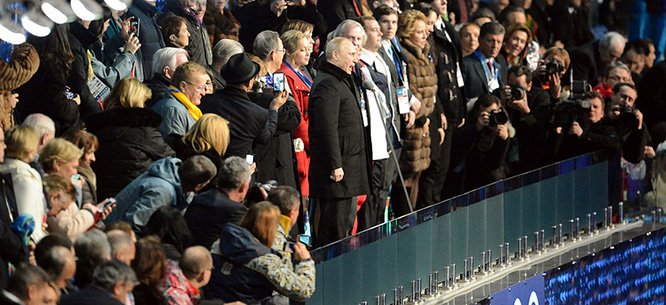Olympic Blindness
Olympic Blindness

There is a temptation on the part of all presidents of the International Olympic Committee (IOC) to declare whatever games they have presided over a success. Thomas Bach, the IOC’s new president and himself a gold medal winner for Germany in the team foil event at the 1976 Summer Olympics in Montreal, is no exception.
“We saw excellent Games,” Bach told reporters just before the start of the Olympic closing ceremonies in Sochi. Bach also expressed his irritation over governments that “sent political messages on the backs of their athletes.” They were in his judgment not acting in the Olympic spirit. “Mr. Putin had been playing an important role in the preparation of these Games. If that would not have been the case, we would have been sitting here in a very different mood,” Bach said.
Bach’s obliviousness is hard to fathom, even if one forgets that the Olympics occurred while Viktor Yanukovych, Russia’s choice for president of Ukraine, was murdering his own people in the central square of Kiev. Within Russia there were not only Putin’s anti-gay laws to consider, but the much photographed attack, made shortly before the Olympics ended, on the Russian punk group, Pussy Riot.
As they were singing their satirical “Putin Will Teach You to Love the Motherland,” the group was set upon by Cossacks who struck them with whips and Russian police who sprayed them with pepper gas. Two members of the group, Nadezhda Tolokonnikova and Maria Alekhina, had the balaclavas they were wearing torn off them.
Bach’s declaration of success has a creepy parallel in what happened more than three-quarters of a century ago when the American Olympic Committee, under the direction of Avery Brundage, voted to participate in the 1936 Olympic games, despite Germany’s anti-Semitism and the exclusion of non-Aryans from Germany’s Olympic team. Today’s Russia is far from the horror Nazi Germany was. What links past and present is the willingness of Olympic officials to overlook authoritarian repression.
Nazi propaganda minister Joseph Goebbels understood that the 1936 Olympics could be a showcase for Germany, and the Nazi government went all out to build a 325-acre Olympic sports complex five miles west of Berlin, spending 42 million Reichmarks in the process. Goebbels even had Hitler’s opening Olympic proclamation followed by German composer Richard Strauss’s Olympic Hymn.
Like the Russians today, the Germans were successful in their Olympic undertaking. They created the world’s largest outdoor stadium, a 110,000-seat venue built of natural stone. They also took down all “Jews Not Welcome” signs from public places during the Olympics and removed Julius Streicher’s anti-Semitic paper, Der Stürmer, from newsstands.
Brundage could always excuse his actions by pointing to the four gold medals won by American track star Jesse Owens—constantly referred to as “the Negro Owens” by German broadcasters and journalists. Who Bach would choose as the Jesse Owens of 2014 is anybody’s guess.
Nicolaus Mills is professor of American Studies at Sarah Lawrence College and author of Winning the Peace: The Marshall Plan and America’s Coming of Age as a Superpower.






